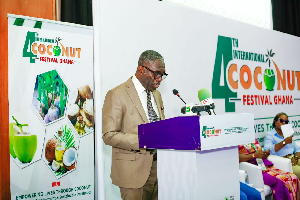William Quaitto, a former Deputy Minister of Food and Agriculture, who is also the Chief Executive Officer of the Tree Crops Development Authority (TCDA), has highlighted the transformative impact of the new Tree Crops Regulations, 2023, during the fourth International Coconut Festival in Accra.
The festival, held from October 21 to October 23, 2024, under the theme “Empowering Lives through Coconut: Innovation, Employment, and Sustainable Livelihoods,” brought together industry leaders to discuss the economic potential of Ghana’s thriving coconut sector.
Quaitto underscored the importance of the new regulations, known formally as L.I. 2471, which aim to enhance standards, create streamlined registration processes, and provide support across the coconut value chain.
“The Tree Crops Regulations, 2023, empower our producers, processors, and traders to maximize their potential while ensuring quality and sustainability,” Quaitto remarked.
As Ghana’s coconut industry continues to expand, Quaitto expressed optimism about the positive impacts of the Tree Crops Regulations, 2023.
“These regulations are crucial for setting high standards and creating a competitive, sustainable coconut sector that can thrive in the global market,” he said.
The International Coconut Festival emphasised the critical role of regulations in driving growth and resilience in Ghana’s coconut industry, creating optimism for the sector’s future.
The Tree Crops Regulations, 2023, outline mandatory registration for industry actors and specify the types of support services available to registered members.
Producers gain access to extension services, quality seedlings, and research-driven innovations, while aggregators can receive licenses to source directly from farmers.
Registered processors benefit from export subsidies, inventory management support, and access to investment funds.
To ensure compliance and industry standards, the regulations require applicants to provide a comprehensive set of documents, including certificates of incorporation, environmental assessments, and tax compliance documentation.
The regulations establish several licensing categories, including plant multiplication, aggregation, and processing, and incentivize local investment by providing tax waivers on processing machinery.
This structured approach not only supports actors in the industry but also promotes sustainability and innovation.
The fourth edition of the International Coconut Festival, co-organized by GEPA, the Western Regional Coordinating Council (WRCC), and the ACG, aimed to promote investment in the sector while providing mentorship and networking opportunities for young people and women.
The festival attracted coconut farmers, policymakers, researchers, and marketers, with exhibitions showcasing a wide variety of coconut products at the Accra International Conference Centre.
Ghana has emerged as Africa’s leading coconut exporter and ranks 12th globally, producing over 500,000 metric tonnes of coconut annually.
In 2022, the country earned $15 billion from coconut exports, with projections to reach $25.3 billion by 2029.
AM/AE
Watch the latest episode of Ballot Briefing below:
Click to view details



Business News of Saturday, 26 October 2024
Source: www.ghanaweb.com

















